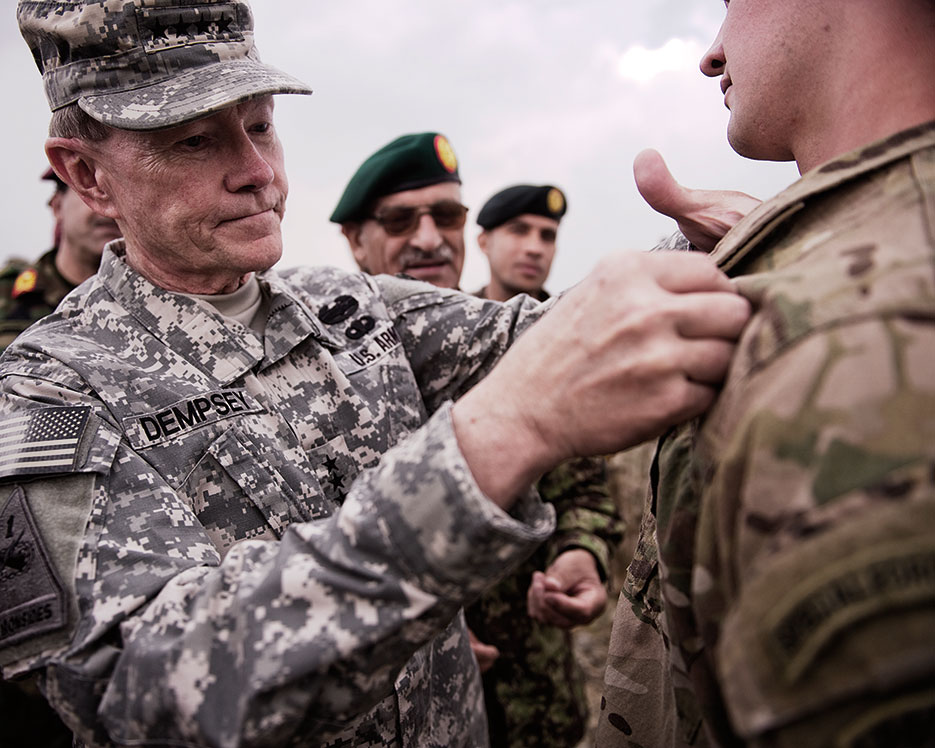As the Joint Force prepares for the challenges and opportunities of tomorrow, our focus is not simply on military power and platforms. We are laser-focused on leadership. It is the all-volunteer force and its leaders—our people—who remain our greatest strategic asset and the best example of the values we represent to the world.
To deliver the future force the Nation needs, we must develop leaders who can out-maneuver, out-think, and out-innovate our adversaries, while building trust, understanding, and cooperation with our partners. This demands leaders who can think through complexity, who are adaptable and agile, and who can build teams to accomplish missions. Our leaders must also be able to successfully navigate ethical gray zones where absolutes are elusive.

Chairman awards Combat Infantryman Badge to coalition special operations forces soldier at Camp Morehead, Afghanistan (DOD/Clayton Weis)
As we chart the course and speed for leader development within the Joint Force, the most direct way to build and reinforce the Desired Leader Attributes is through our military education institutions, including our joint professional military education (JPME) schools.
But we cannot stop there. Being a leader requires a dedication to lifelong learning. I believe that if we are not maneuvering outside our intellectual comfort zone, we are stagnant and falling behind. We can never allow ourselves to be too busy to learn.
Innovation and Agility
General George C. Marshall advocated two things during the interwar years: education and innovation. Because of the demands of the last 13 years of war, however, we have not been signaling that we value education as an essential element of leader development. That is changing. We now describe PME as a significant investment in—and not a tax on—the individual and the Profession of Arms.
To the extent that education is a strategic resource, the investment in our PME programs will determine the effectiveness of our profession and the security of our nation.
For today’s leaders, understanding the challenges of the global security environment is not an option. It is not a theoretical exercise. It is our life’s work. We ask our men and women to help solve some of the world’s hardest problems in its hardest places. The more we understand the history, culture, and power dynamics in play, the better and more enduring the results.
Our charge, then, is to leverage the diverse experiences of our combat-tested Soldiers, Marines, Sailors, Airmen, and Coastguardsmen in our classrooms. We have to keep challenging them with our curricula. And we have to channel their intellectual curiosity into broad-based mental agility that can be applied to an environment that is complex, ambiguous, and uncertain.
Leading Educational Change
Our PME systems have to embrace change or risk irrelevance. We know that a quality faculty is the center of gravity in quality, relevant education. Our educators should be our best and brightest. For our uniformed cadre, we cannot allow schoolhouse assignments to be seen as a career dead end. Rather, these assignments should signal a commitment to intellect dexterity that will be important in higher levels of responsibility. Similarly, we must be able to attract civilian faculty members who have a record of accomplishment in their particular fields.

General Dempsey shakes hands with crew chief of Navy SH-60 Seahawk helicopter at Andersen Air Force Base, Guam, while en route to Singapore for annual Asian security summit Shangri-La Dialogue (DOD/D.Myles Cullen)
This is important because when we consider that we will have to think our way through complex challenges, the power lies in the integration of faculty and student. This juncture is where the big ideas are incubated, fueled by innovative research. Every relationship and every idea matters, especially when those things are applied to the toughest struggles we face today.
Looking Ahead
Drawing down the force, we will not allow ourselves to be both smaller and less smart. We must better match our PME programs with our Desired Leader Attributes and with our experience. As author Clarence Day states, “Information’s pretty thin stuff unless mixed with experience.” Therefore, we are reinvigorating our commitment to tailored education—exploring how best to adapt our learning institutions to serve the diverse talent of our men and women and to cultivate agile thinkers in a global Joint Force.
For example, at my direction, the National Defense University (NDU) is embarking on a transformation of its JPME programs. We are mapping Desired Leader Attributes to the curriculum to ensure we are delivering them. We are focusing on the professional interests and learning objectives of our students. We are more closely connecting the University to the practitioners of strategic art. The goal is an integrated learning experience—a personalized partnership between the University and the student. By adapting, NDU will remain one of the preeminent senior leader development institutions in our nation. This is not to gloss over the challenges we face in our PME institutions. Change is tricky. At the same time, I am optimistic because of the dedication of our men and women to solve the challenges of today and tomorrow. And I am confident because through these uncertain times, we have men and women who are passionate about learning, leading, and making a difference. JFQ
Martin E. Dempsey
General, U.S. Army
Chairman of the Joint Chiefs of Staff